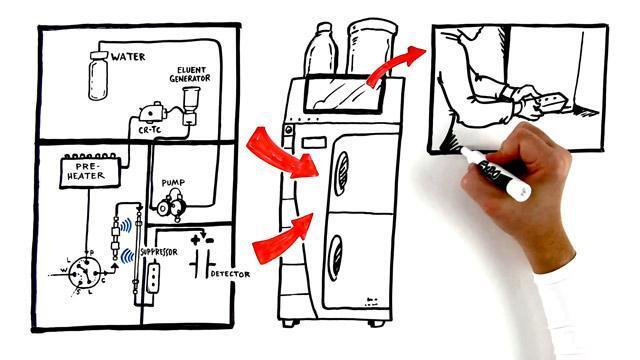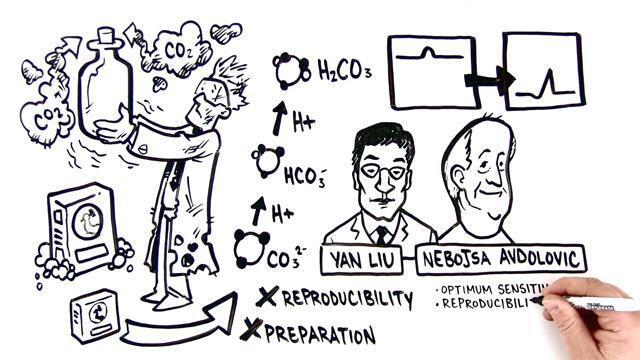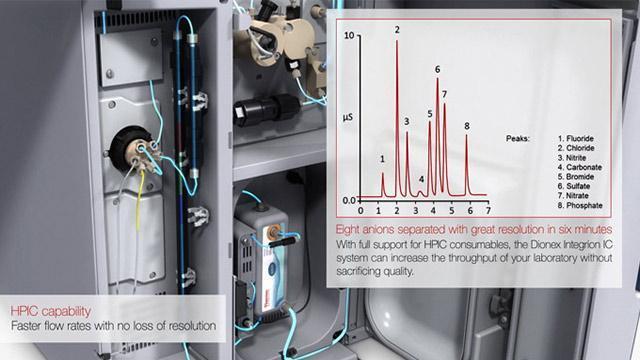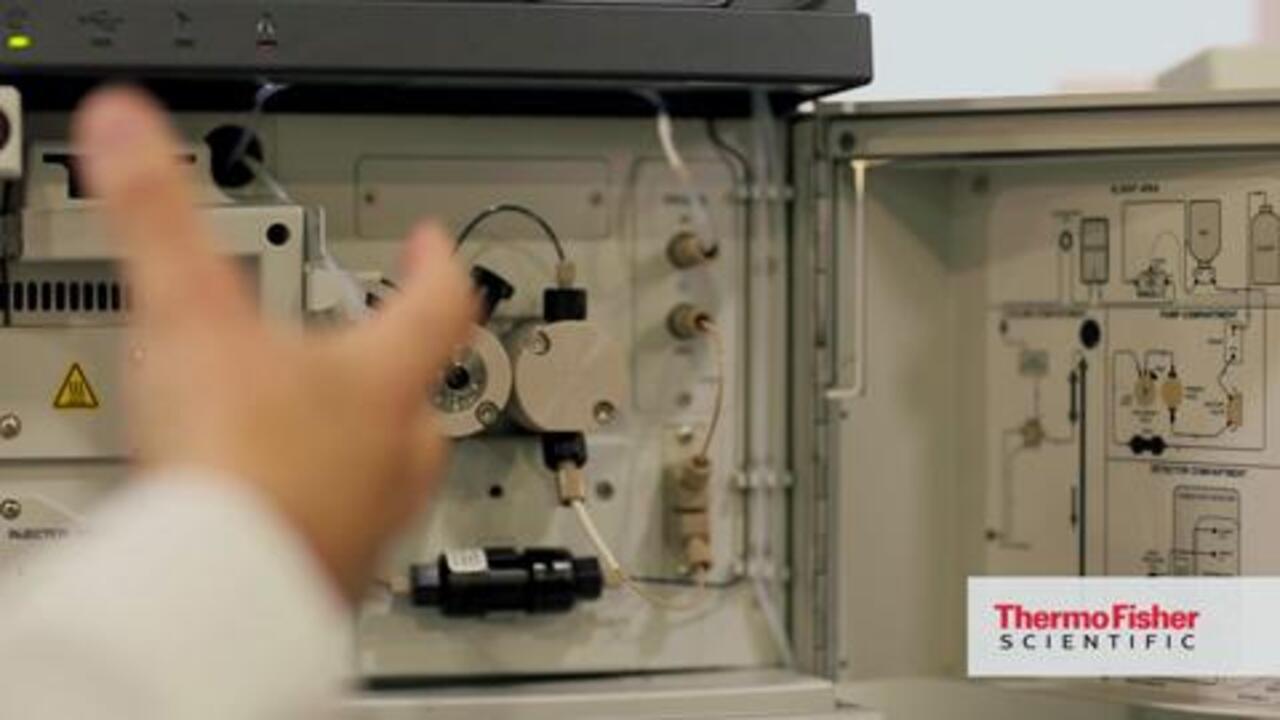
Dionex Integrion HPIC System: An easy solution for routine analysis
Achieve versatile and efficient separations that meet your routine ion analysis demands with the reliable Thermo Scientific Dionex Integrion HPIC system. Its high-pressure ion chromatography (HPIC) capabilities enable faster analysis without compromising data quality. The Dionex Integrion HPIC system is designed for routine ion chromatography (IC) applications for water, food and beverage, biofuels and pharmaceutical analysis.
Highlights
Simple plumbing layout
The plumbing layout of this high-pressure ion chromatography system is based on a logical flow path for easy component access in a compact platform with a small physical footprint.
Automated Eluent Generation (EG)
Optional Reagent-Free Ion Chromatography with Eluent Generation (RFIC-EG) combines automated eluent generators and electrolytically regenerated suppressors to create eluents and regenerants.
Inert, reliable components
Inert, nonmetallic PEEK components throughout the Dionex Integrion HPIC system ensure compatibility with corrosive eluents and analyses free from metal contamination. Easy-to-install IC PEEK Viper fittings have low dead volume and require no special training or tools.
Flexible detector options
The Dionex Integrion HPIC system allows for easy, swappable integration with either a conductivity detector (CD) or an electrochemical detector (ED). The system is also compatible with various external detectors, including a mass spectrometer (MS) or a variable wavelength detector (VWD).
Wide range of IC columns
The Dionex Integrion HPIC system is compatible with a wide variety of column sizes, including smaller-particle-size 4 µm columns for HPIC capabilities, which provide faster run times and better resolution, to meet the requirements of your applications.
CDS Software
The Dionex Integrion HPIC system comes with the easy-to-use Thermo Scientific Chromeleon Chromatography Data System (CDS). This software platform provides powerful control and data processing for IC and offers eWorkflows that make all our essential applications easily accessible.
Videos
System specifications
The table below provides an overview of the Dionex Integrion HPIC system specifications. Not all specifications are listed. For a full list of the specifications, download the Dionex Integrion HPIC system specifications sheet.
Specification |
Dionex Integrion HPIC System |
Pump |
|
Type |
Dual-piston (in series), microprocessor controlled, constant 10 mm primary stroke length, variable speed isokinetic with eluent precompression |
Construction |
Chemically inert, metal-free PEEK pump heads and flow path; compatible with aqueous eluents of pH 0–14 and reversed-phase solvents |
Pressure range |
0–41 MPa (0–6000 psi) |
Flow rate range |
0.000–10.000 mL/min with ability to set flow increments at 0.001 mL/min |
Flow precision |
< ±0.1% |
Flow accuracy |
< ±0.1% |
Pressure ripple |
< 1% at 1.0 mL/min, typical |
Eluent on-off valve |
Electrically actuated, standard |
Piston seal wash |
Optional, automatic operation |
Vacuum Degas |
Integrated, optional |
Eluent generator |
|
Eluent types |
Up to two eluent generator cartridges |
Eluent concentration range |
0.1–100 mM |
Flow rates |
0.1–3 mL/min |
Maximum operating pressure |
Dionex EGC 500 cartridge: 35 MPa (5000 psi) |
Maximum solvent concentration |
Cations: 0% |
Gradient profiles |
Standard - any combination of linear, convex and concave positive and negative gradient profiles |
Column compartment |
|
Injection valves |
Up to two high-pressure valves, either 6- or 10-port |
Columns supported |
Up to two 1-9 mm i.d., maximum length 250 mm analytical column with 50 mm guard column |
Constant temperature zone |
Optional |
Detector compartment |
|
Constant temperature zone |
Optional |
Suppression modes |
|
Chemical suppression |
2 mm and 4 mm, anion and cation, membrane suppression |
Electrolytic suppression recycle mode |
2 mm and 4 mm, anion and cation, membrane suppression |
Electrolytic suppression external water mode |
2 mm and 4 mm, anion and cation, membrane suppression |
Non-suppressed conductivity |
Supported - both anion and cation |
Conductivity detector |
|
Electronics type |
Microprocessor controlled digital signal processing, autoranging |
Cell drive |
8 kHz square wave |
Linearity |
1% |
Resolution |
0.00238 nS/cm |
Output range |
Digital Signal Range: 0–15,000 µS/cm |
Noise, wet |
≤ 0.2 nS at 23 µS/cm background |
Filter |
Rise times 0 to 10 s, programmable |
Sampling rate |
1 to 100 Hz, user settable or automatic |
Cell temperature |
7 °C above ambient to 60 °C maximum |
Cell temperature stability |
< 0.001 °C |
Cell temperature compensation |
Default 1.7% per °C; programmable from 0–3% per °C |
Flow cell maximum pressure |
10 MPa (1500 psi) |
Flow cell volume |
0.7 µL |
Cell electrodes |
Passivated 316 stainless steel. Compatible with MSA |
Cell body |
Chemically inert polymeric material |
Heat exchanger |
Inert, tortuous path for low longitudinal dispersion |
Electrochemical detector |
|
Electronics type |
Microprocessor controlled digital signal processing |
Electronic noise, wet |
IPAD (Au electrode) < 50 pC at 10 mM KOH, DC Amperometry (GC) < 10 pA |
Potential range |
-2.0 to 2.0 V in 0.001 V increments |
Signal range (digital and analog) |
Integrated Amperometry: 50 pC to 200 µC DC Amperometry: 5 pA to 74 µA |
Filter |
0–10 s response time, user settable |
Control mode |
Local or remote control using relay closures or TTL, or control using Chromeleon CDS software via DC module |
Cell body |
Titanium body. Compatible with 2–7 mm i.d. columns |
Working electrodes |
Conventional: gold, glassy carbon, platinum, and silver Disposable: gold, platinum, carbon, and silver |
Reference electrode |
pH-Ag/AgCl combination, one piece design |
Autoranging |
Yes |
Analog output |
User selectable full scale of 10, 100, or 1000 mV |
Cell volume at working electrode |
< 0.2 µL |
Maximize cell operating pressure |
0.7 MPa (100 psi) |
Internal power supplies |
|
Internal power supplies |
Constant current (CC) power supplies Option 1: 1 channel CC [0 - 500 mA] |
System software |
|
Software |
Chromeleon CDS software, version 7.2 or higher |
Automated workflow wizards |
Standard feature |
System smart startup and shutdown |
Standard feature |
Automation support of 3rd party instruments |
Fully controls over 400 different instruments from more than 30 manufacturers, including GC, HPLC, and MS |
Customizable system control panels |
Standard feature |
Signal channels |
Detector signals and pump pressure as standard |
Data trending plots |
All numerical device parameters |
System status virtual channels |
Standard feature |
Network failure protection |
Standard feature for networked installations |
System trigger commands and conditionals |
Standard feature |
Daily audit trail |
Standard feature |
Sample audit trail |
Standard feature |
System calibration storage |
Factory, present and previous. Completely user selectable |
Customized reporting |
Standard feature with unlimited report sheets |
GLP compliance |
Optional |
Physical specifications |
|
Dimensions (h × w × d) |
62.5 × 30.0 × 55.9 cm (24.6 × 11.8 × 22 in) |
Weight |
41 kg (90 lb) |
Power requirements |
100–240 V ac, 50-60 Hz autoranging |
Operating temperature |
4–40 °C (40–104 °F); cold-room compatible (4 °C) as long as system power remains on |
Operating humidity range |
5–95% relative, noncondensing |
Control modes |
Full control through front panel and Chromeleon CDS software; alternative control through TTL or relay closures; two relay outputs, two TTL outputs, four programmable inputs |
USB communication protocol |
One USB input; one built-in two-output USB hub |
Leak detection |
Built-in, optical sensor |
For Research Use Only. Not for use in diagnostic procedures.



